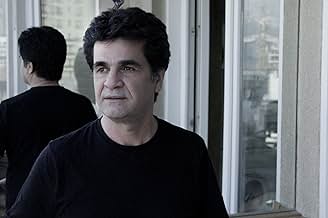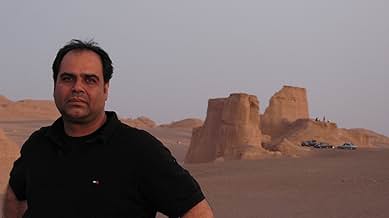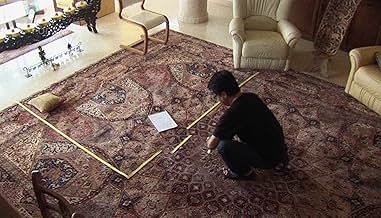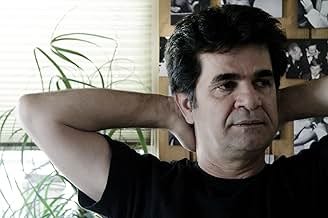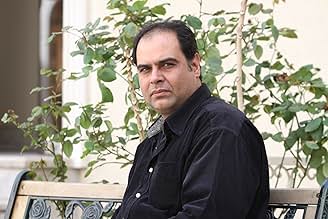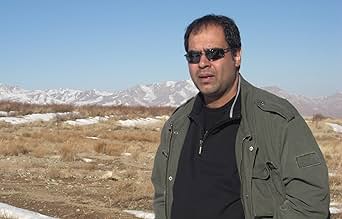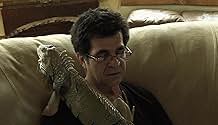CALIFICACIÓN DE IMDb
7.4/10
5.9 k
TU CALIFICACIÓN
Han pasado meses desde que Jafar Panahi, atrapado en la cárcel, ha estado esperando el veredicto de la corte de apelaciones.Han pasado meses desde que Jafar Panahi, atrapado en la cárcel, ha estado esperando el veredicto de la corte de apelaciones.Han pasado meses desde que Jafar Panahi, atrapado en la cárcel, ha estado esperando el veredicto de la corte de apelaciones.
- Premios
- 10 premios ganados y 14 nominaciones en total
- Dirección
- Guionista
- Todo el elenco y el equipo
- Producción, taquilla y más en IMDbPro
Opiniones destacadas
Hidden inside a birthday cake and smuggled out of the country, the 75-minute "effort", This is Not a Film, tells us all we need to know about the cruelty of the Iranian dictatorship and the courage of film director Jafar Panahi. Panahi, who has given the world such masterpieces as The White Balloon, The Circle, and Crimson Gold was arrested in March, 2010 and faces a ban of twenty years from making films and a six-year prison sentence for "propaganda against the Islamic Republic." This refers to exercising free speech by speaking out against the rigged elected of Iranian President Mahmoud Ahmadinejad.
As part of his sentence, Panahi is barred from making films or writing screenplays, is unable to speak in his behalf, and forbidden to leave the country. While awaiting the results of his appeal, Panahi is filmed in his home by fellow director Mojtaba Mirtahmasb using a digital video camera and a cell phone. What begins as an innocuous home movie with Panahi sitting at his table eating breakfast takes on an added dimension when he calls Mirtahmasb, asking him to come by to discuss some ideas, but cautions him not to tell anyone about his visit.
While waiting for his friend to arrive, he talks on the phone with his lawyer who tells him that the court may waive the 20-year ban on filmmaking but are not likely to reduce his jail sentence. When Mirtahmasb arrives, Panahi reads from his latest screenplay which was rejected by the censors. Acting out the story, he puts tape around the area to suggest the apartment in which the story occurs. As he begins to read the screenplay about a young woman forbidden by her parents to attend university, tears come to his eyes and he stops, saying poignantly,
"If we could tell a film, then why make a film?" and expresses his regret about the harshness of the penalty he faces. Soon he takes care of his pet Iguana, Igi, and cares for a neighbor's dog who doesn't know the value of silence. As fireworks explode on the streets to celebrate the Persian New Year, a college student arrives to collect the trash as a substitute for the custodian, and the two engage in a dialogue, remembering the day when Panahi was arrested. To bring home the point even more forcefully, Panahi watches as a TV newscaster proclaims that fireworks are illegal. What started out as a home movie at the end becomes an act of non-violent protest.
As part of his sentence, Panahi is barred from making films or writing screenplays, is unable to speak in his behalf, and forbidden to leave the country. While awaiting the results of his appeal, Panahi is filmed in his home by fellow director Mojtaba Mirtahmasb using a digital video camera and a cell phone. What begins as an innocuous home movie with Panahi sitting at his table eating breakfast takes on an added dimension when he calls Mirtahmasb, asking him to come by to discuss some ideas, but cautions him not to tell anyone about his visit.
While waiting for his friend to arrive, he talks on the phone with his lawyer who tells him that the court may waive the 20-year ban on filmmaking but are not likely to reduce his jail sentence. When Mirtahmasb arrives, Panahi reads from his latest screenplay which was rejected by the censors. Acting out the story, he puts tape around the area to suggest the apartment in which the story occurs. As he begins to read the screenplay about a young woman forbidden by her parents to attend university, tears come to his eyes and he stops, saying poignantly,
"If we could tell a film, then why make a film?" and expresses his regret about the harshness of the penalty he faces. Soon he takes care of his pet Iguana, Igi, and cares for a neighbor's dog who doesn't know the value of silence. As fireworks explode on the streets to celebrate the Persian New Year, a college student arrives to collect the trash as a substitute for the custodian, and the two engage in a dialogue, remembering the day when Panahi was arrested. To bring home the point even more forcefully, Panahi watches as a TV newscaster proclaims that fireworks are illegal. What started out as a home movie at the end becomes an act of non-violent protest.
This is not a film and also not a documentary in a proper sense. This is a Video recording of two persons. But the good part is that within the few minutes you will understand why this film had to be made. A person cannot stop his talent for longer. This is happening with Jafar Panahi, the Iranian director who is fighting with his government. He has to stay inside his house without making films and he might go to jail. In the middle you might feel a little bored because of no change in location but eventually you will understand his limitations and the desperation which caused him to make this.
PROS: The film is slow but to some extend you will want to forgive for everything. He tries to make the documentary interesting by telling some of his previous films experiences and those are really amazing. His pet will keep you alive all the time. In few words, I would say that this is one of the best documentaries.
CONS: Got a little bored in the middle.
Message: "Don't stop because of obstructions." Verdict: "A must watch documentary."
PROS: The film is slow but to some extend you will want to forgive for everything. He tries to make the documentary interesting by telling some of his previous films experiences and those are really amazing. His pet will keep you alive all the time. In few words, I would say that this is one of the best documentaries.
CONS: Got a little bored in the middle.
Message: "Don't stop because of obstructions." Verdict: "A must watch documentary."
I have not seen any of Jafar Panahi's films. I've heard of Crimson Gold through the iconic image on the DVD cover but otherwise I'm not aware of his style. This Is Not A Film would be a great introduction as the filmmaker himself compares how he feels to the characters he created 10 years prior and analyses his own style of filmmaking. As someone who is interested in making films, this is a really fascinating documentary. Essentially a home video turned into a film, where its shown in the film itself when they decided to turn it into a film, it unintentionally breaks down storytelling and storytelling methods as Panahi demonstrates a film idea he has in a pitch like process to the point where he questions why we even need the medium of film. The raw emotion in this doc is compelling despite the fact not a lot happens within its 77 minute running time. In the end, you come to know Panahi and his culture more intimately and it's fascinating how his unintentional documentary style is similar to his fiction filmmaking style, especially with an ending that makes your heart skip a beat. I'll contradict the title, this is one hell of a film.
8/10
8/10
Whether it's a film or not is irrelevant, it's a fantastic comment on the state of Iranian democracy
This Is Not A Film comes to audiences already with a high level of notoriety. The famous film behind "cakegate", it's constricted production meant that the film was distributed out of Iran on a USB stick concealed inside a birthday cake. It's the kind of screwball scenario you might find on a Judd Apatow movie, but This Is Not A Film is no laughing matter. As the title would assume, this is not so much of a film as it is a film exorcism.
Whilst under house arrest, and pursuing an appeal against a six year prison sentence and 20 year ban from directing, esteemed Iranian auteur Jafar Panahi (The Mirror, Crimson Gold) invites fellow filmmaker Mojtaba Mirtahmasb into his home to crudely document a day in his tormented life.
Shot on a digicam and later an iPhone, we follow Panahi shuffling around his apartment, feeding his daughter's pet iguana, paying the delivery boy for takeaway food, and calling his tenacious attorney trying to get him out of house arrest. At first, it's a minor study of segregation and loneliness, but This Is Not a Film is at it's most enthralling when Panahi expresses his natural directing flare; acting out his latest screenplay from the (dis)comfort of his family living room, discussing camera angles to the most minute detail, and reflecting on how he managed to reach such a raw level of intimacy in his previous works. Whether you are aware of his filmography or not, it's clear that Panahi is an exuberant cinephile, which makes his current, and ongoing battles with the government even more distressing.
If you were forced to judge this meta-commentary diatribe, one could suggest that Panahi and Mirtahmasb fail to present a bigger picture on the crisis of the state's dominance over artistic intent. Similarly to 2006′s female equality drama Offside, This is Not a Film is incredibly subtle with it's political allegories, bordering on the coyly parabolic. Instead of presenting a bigger, ultimately more controversial picture on the crisis of state dominance in the creative industries, Panahi and Mirtahmasb reach a palpable level of verisimilitude in the very smallness of the situation. It all comes together in a final twenty minute sequence where Panahi falls behind the camera and back into storyteller mode (it could cost him his life, but he can't help it). He follows a young dustman around the apartment block and asking him what his plans for the future will be. The cordial apprentice is unsure, but it's hopefully going to be a life less frightening than the one Panahi has been dealt.
This Is Not A Film concludes with harrowing sentiment. With the sound of New Years' Eve fireworks and cheering in the background, the screen fades to black, with the credits and special thanks nods are left blank, followed by a final frame that sets out a humble dedication to all Iranian filmmakers. It may be a non-film but, whatever it is, it's certainly a riveting watch; and has rightly earned a place in the Oscars' documentary award shortlist.
Here in the Western world, our access to information, democratic governments and human rights mean that cinema is taken for granted, and filmmakers have it easy. Whilst we bemoan the extortionate prices of popcorn, Panahi and Mirtahmasb are putting their lives on the line to tell the stories they feel they must tell, in the hope that, one day, their nation will be able to have the same sort of pro-democratic freedom as the rest of us.
www.366movies.com
Whilst under house arrest, and pursuing an appeal against a six year prison sentence and 20 year ban from directing, esteemed Iranian auteur Jafar Panahi (The Mirror, Crimson Gold) invites fellow filmmaker Mojtaba Mirtahmasb into his home to crudely document a day in his tormented life.
Shot on a digicam and later an iPhone, we follow Panahi shuffling around his apartment, feeding his daughter's pet iguana, paying the delivery boy for takeaway food, and calling his tenacious attorney trying to get him out of house arrest. At first, it's a minor study of segregation and loneliness, but This Is Not a Film is at it's most enthralling when Panahi expresses his natural directing flare; acting out his latest screenplay from the (dis)comfort of his family living room, discussing camera angles to the most minute detail, and reflecting on how he managed to reach such a raw level of intimacy in his previous works. Whether you are aware of his filmography or not, it's clear that Panahi is an exuberant cinephile, which makes his current, and ongoing battles with the government even more distressing.
If you were forced to judge this meta-commentary diatribe, one could suggest that Panahi and Mirtahmasb fail to present a bigger picture on the crisis of the state's dominance over artistic intent. Similarly to 2006′s female equality drama Offside, This is Not a Film is incredibly subtle with it's political allegories, bordering on the coyly parabolic. Instead of presenting a bigger, ultimately more controversial picture on the crisis of state dominance in the creative industries, Panahi and Mirtahmasb reach a palpable level of verisimilitude in the very smallness of the situation. It all comes together in a final twenty minute sequence where Panahi falls behind the camera and back into storyteller mode (it could cost him his life, but he can't help it). He follows a young dustman around the apartment block and asking him what his plans for the future will be. The cordial apprentice is unsure, but it's hopefully going to be a life less frightening than the one Panahi has been dealt.
This Is Not A Film concludes with harrowing sentiment. With the sound of New Years' Eve fireworks and cheering in the background, the screen fades to black, with the credits and special thanks nods are left blank, followed by a final frame that sets out a humble dedication to all Iranian filmmakers. It may be a non-film but, whatever it is, it's certainly a riveting watch; and has rightly earned a place in the Oscars' documentary award shortlist.
Here in the Western world, our access to information, democratic governments and human rights mean that cinema is taken for granted, and filmmakers have it easy. Whilst we bemoan the extortionate prices of popcorn, Panahi and Mirtahmasb are putting their lives on the line to tell the stories they feel they must tell, in the hope that, one day, their nation will be able to have the same sort of pro-democratic freedom as the rest of us.
www.366movies.com
A late addition to the Cannes 2011 programme after being smuggled into France inside a cake, Iranian director Jafar Panahi's "This is Not a Film" (2011) is by no means your average political documentary. The 75-minute piece, shot partially on an iPhone, captures the day-to-day life of Panahi during a state-imposed house arrest in his Tehran apartment as he appeals a six year prison sentence and 20 year filmmaking ban for his opposition to the 2011 Iranian elections.
Here in the Western world, our access to information, democratic governments, and human rights are taken for granted. Panahi and Mirtahmasb are putting their lives on the line to tell the stories they feel they must tell, in the hope that, one day, their nation will be able to have the same sort of pro-democratic freedom as the rest of us. Gripping entertainment. Little by little "This Is Not a Film" leads to a final scene of overwhelming power. Anyone interested in cinema and/or Iran owes it to themselves to become familiar with this "not" film.
Here in the Western world, our access to information, democratic governments, and human rights are taken for granted. Panahi and Mirtahmasb are putting their lives on the line to tell the stories they feel they must tell, in the hope that, one day, their nation will be able to have the same sort of pro-democratic freedom as the rest of us. Gripping entertainment. Little by little "This Is Not a Film" leads to a final scene of overwhelming power. Anyone interested in cinema and/or Iran owes it to themselves to become familiar with this "not" film.
¿Sabías que…?
- TriviaDirector Jafar Panahi was put under house arrest in 2010 and banned from filmmaking for 20 years. This film was smuggled out of Iran on a USB stick hidden in a cake.
- Citas
Mojtaba Mirtahmasb: It's important that the cameras are ON.
Selecciones populares
Inicia sesión para calificar y agrega a la lista de videos para obtener recomendaciones personalizadas
- How long is This Is Not a Film?Con tecnología de Alexa
Detalles
Taquilla
- Total en EE. UU. y Canadá
- USD 77,016
- Fin de semana de estreno en EE. UU. y Canadá
- USD 12,608
- 4 mar 2012
- Total a nivel mundial
- USD 88,758
- Tiempo de ejecución
- 1h 15min(75 min)
- Color
Contribuir a esta página
Sugiere una edición o agrega el contenido que falta


